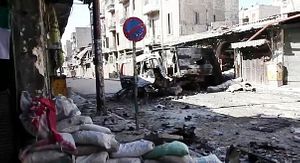It was the Indonesian jihadist leader Abu Bakar Bashir who once described Syria as a “university for jihad education,” and it appears that his assertion was taken to heart by Indonesia’s extremists.
A new report released by the Institute for Policy Analysis of Conclit (IPAC) titled “Indonesians and the Syrian Conflict” (PDF) sheds light on the troubling extent to which the Syrian conflict has drawn Indonesian extremists “in a way no foreign war has before.” The report isn’t the first to emphasize that Indonesia Islamist organizations have fixated on Syria – this much was known as early as 2012. It rather focuses on explaining the allure of Syria in comparison to similar causes in the past, such as Palestine, Bosnia, and Afghanistan, that have drawn the attention of Indonesian extremists .
At the core of it, the report takes to Islamic eschatology which predicts that “the final battle at the end of time will take place in Sham, the region sometimes called Greater Syria or the Levant, encompassing Syria, Jordan, Lebanon, Palestine and Israel.” It additionally emphasizes that coverage of the Syria conflict within Indonesia has focused on framing the conflict as one where Bashar al-Assad’s government has directed atrocities against pious Sunni Muslims.
According to IPAC, some 50 of the 11,000 or so foreign fighters in Syria from over 74 countries are “thought to be Indonesian.” The number is based off an Indonesia foreign ministry estimate from December 2013 but is widely unconfirmed.
The report finds that Indonesian jihadis are divided between the two major hardline Sunni factions in Syria – the al Nusra front and the Islamic State of Iraq and Sham (ISIS). Indonesian extremists are also divided on the sectarian nature of the conflict with some viewing the conflict as a broader manifestation of Shia-Sunni rivalry and others viewing the sectarian narrative as an inaccurate imposition by the West.
According to Sidney Jones, an expert at IPAC, the Syrian conflict has inspired a wave of anti-Shia rhetoric within Indonesia. Jones speculates that this is partly due to the involvement of “Saudi-funded organizations” within the country. Saudi Arabia has been devoting greater attention to Indonesia, the world’s largest Muslim-majority nation, as of late; the governments of Saudi Arabia and Indonesia recently concluded a defense cooperation agreement.
Within Indonesia, Jemaah Islamiyah, the perpetrator of the 2002 Bali bombings and a still influential extremist organization, is an important source of the inflow into Syria according to IPAC. The report notes, “From late 2012 to January 2014, JI’s humanitarian wing, Hilal Ahmar Society Indonesia (HASI), sent ten delegations to Syria, bringing in cash and medical assistance to the Islamist resistance in a way apparently designed to open channels for more direct participation in the fighting.”
Concerns that Indonesian jihadists could return from Syria reinvigorated and ready to bring the fight to Southeast Asia are worth taking seriously. Jemaah Islamiyah, in particular, is thought to have links to the Moro Islamic Liberation Front and other extremist groups in the region. As more Indonesian extremists head to Syria and eventually return to Indonesia, instability in Aceh could grow more severe. The IPAC report advises that it may be premature to conclude that these extremists will return from Syria more troublesome than before; Indonesia’s relative political stability, economic fortitude, and tranquil regional environment generally provide an inhospitable environment for widespread extremism.

































